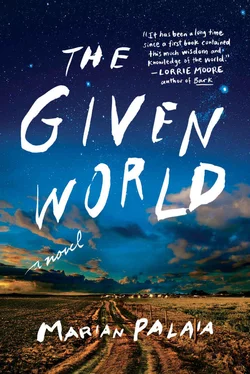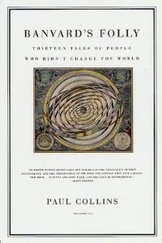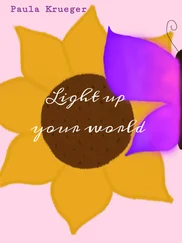When Frank worked the Sunset, he’d see her truck sometimes — late, when she was done — at Ocean Beach or somewhere along Great Highway, the girl looking so small in the driver’s seat, forehead resting against the steering wheel, staring through it at the ocean while the sun rose behind her. Or not, since out there the sun didn’t always rise. Sometimes he’d stop and talk to her, but he learned to recognize a certain look that said probably best to leave her alone.
Not everyone was comfortable around her. They’d always been an all-boys club, and letting a girl in meant something had gone haywire, seriously. She took some grief from a handful of blabbermouths, and mostly rolled with it, but a couple of times she went off. The way it looked to Frank was the ones she went off on had it coming. Even when she wasn’t taking down some joker talking about her ass or whatever, she had a mouth on her that would surprise a fellow, for real. He was glad she never got mad at him.
There was one driver she got close to early on: Eddie, who everyone suspected and later found out for sure was gay. A fag, then. A homo. “Gay” wasn’t even a word yet, at least not one any of them had ever heard. Anyway, Frank would see them together a lot, and the thing he noticed was how often Eddie could make her laugh. It was nice to see, nice to know she could do that. Some of the guys referred to them as “the girls,” but Frank didn’t. Because he didn’t think it was all that funny.
One morning she and Frank were coming in at the same time after last call, driving side by side on Geary. It was a warm day already and they both had their doors slid open. She had her whole left leg out the driver’s side, her foot up on the side mirror bracket — a total gangster lean. A car pulled up next to her in the turn lane, and the guy driving yelled through his passenger window: “Is that a good job?”
“This is a great job,” she said. And she was smiling wide, bopping her head to some happy song inside it. She threw a paper to the guy through his window and took off waving when the light turned green.
After they got back to the plant and checked in, she and Frank walked out together.
Riley said, “You want to go get a beer? I know it’s kind of early, but—”
“Early? We just finished an eight-hour shift.”
They walked over to the M&M, drank a pint, ate some fries, and talked about the job, the clueless supervisors, the chance of rain on Sunday (rainy days were a pain in the butt). He asked her about Wyoming, and she looked puzzled for a second.
“Oh. You mean Montana.”
“Yeah, right. Montana, sorry.”
“It’s okay. Easy to confuse those places, I guess, if you’re not from there.”
She told him about the farm, the dog, her parents. “They’re pretty laid-back,” she said. “They’re really nice people.” She hesitated, gnawing at her lower lip. “I should probably write to them or call more often. I bet they worry about me, off in the big city. Especially my dad. You know how dads are.” For a second, she looked about twelve.
“Why did you leave?”
“It was time. I wanted to see the ocean something awful. I think I may have been a fish in a past life. Like a flounder. Both eyes on one side of my head.”
“That would be interesting,” he said. “Make it kind of hard to drive.”
She picked up a french fry and put it back down on the plate. Straight-faced, she nodded. “That’s true.”
It was easy for her to make him laugh.
He asked if she had more family, brothers or sisters. She made a movement with her head, but he couldn’t tell if it was a nod or a shake. She took a long drink of beer and said, “Have you ever seen a barn cat?”
“Not that I can recall.”
“Really? A guy from Texas?”
“Not a lot of barns in Dallas.”
“Oh. I see.”
She told him how they jump, springing into the air like grasshoppers, or those tiny African bush babies she’d seen once on TV.
“When you open the barn door,” she said, “it’s like the whole place comes alive. All these scrawny little cats climbing the walls or shooting straight in the air like bottle rockets.”
“Did they have names?”
“Yeah,” she said. “They still do, I bet. My dad names them all Slick or Slim. Or some variation, like Slick Britches or Slim Bob.”
“He can tell them apart?”
“Mostly. He’s like that. Pays attention to things he thinks need attention paid to.” She turned her head toward the window. Frank looked to see what she was seeing, but it was just another day on Howard Street: construction, double-parked cars, a guy passed out at the bus stop, still holding tight to an empty Colt 45 bottle. He figured she was probably missing home, which was perfectly natural. We all miss home sometimes.
She insisted on paying. “A shitload of overtime last week,” she said.
Eventually she had enough seniority to get her own home-delivery district, where she got to hire her own kids and teach them all the tricks she’d learned from Primo, and some new ones she’d taught herself. She ran a tight ship, and the kids did a good job for her. Later on, when she started calling in sick, hers was the best district to sub on, because you knew there wasn’t going to be any trouble. Just get the papers out to the corners, and the kids would do the rest. No complaints, no hassles, no showing up late or not at all. It was sweet; she kept it that way by treating them right, like adults, like human beings. And for a time it seemed like she’d found her spot, a place she could be contented, a place she felt like she knew what she was about.
She and Frank met regularly for coffee during work, helped each other with down routes, killed time together at random corners waiting for complaints or last call. Sometimes Eddie would join them; sometimes one or two of the other drivers. She said they should form a band, call themselves the Vampires.
Before too long, she was hanging around Frank’s apartment like she lived there, lying on the floor using Spot for a pillow; tooling around with the Martin (she knew a few chords, but got frustrated trying to make the changes); pulling books down off the shelf and asking Frank about poems, stories, certain words. She wanted to know what everything meant, and he tried to explain that most of the time there was no single meaning; a lot depended on who was trying to figure it out, and what they brought with them to the show.
“The show?”
“Yeah. The show. Life.”
She liked that. “The life show,” she said.
One time she asked him if he’d gone to Vietnam. She was playing his guitar, not looking at him; the question came out of nowhere.
“No,” he said. “I didn’t have to go. And they wouldn’t have let me even if I’d wanted to.”
She looked up. He read in her expression, How does that work?
He tapped his chest. “My ticker. It’s a little bit broken.”
“Oh,” she said. And maybe it sounded like there was something in that small story she doubted, or didn’t like, or hadn’t wanted to hear, but he was probably hearing things himself, filtered through the unavoidable fact of all those other guys going and him staying behind. Probably.
It was something, in any case, they didn’t talk about anymore.
• • •
The wheels started coming off slowly at first. Since bad behavior at the paper was more common than not, and people rarely got fired for any of it, those wheels took their time. First Riley became something of a regular at Hanno’s, a bar in the alley behind the plant. She had a few new pals by then who were pretty good drinkers, and it didn’t take long before her car — this incredibly beat-up Mustang — would be out there from quitting time at eleven o’clock to three or four in the afternoon, and sometimes later. Much later. Like going-back-to-work time.
Читать дальше












